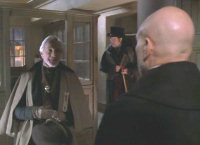Cudiles or cudulles
Q From Andrea Alam: I was watching the 1999 version of Dickens’s A Christmas Carol over the holidays, the version starring Patrick Stewart. In an early scene, two men come into Scrooge’s office soliciting funds for the poor. One of them addresses him by saying, “May I press your cudiles, sir?” What are cudiles? I’ve been unable to find the word anywhere and even the reference librarian at my local public library is unable to find it.
A You are not alone in your bafflement. A search online shows that the question has been asked several times with no response. I’m stumped, too, as is every expert I’ve asked, though there are a couple of hints. The cudiles spelling comes from the TV subtitling (closed captioning), though that’s an attempt at phonetic spelling by an American titler confused by an English accent. No such word is in the English language, of that I’m pretty sure. Dickens certainly didn’t write that line into his story. What could have been meant?

Edward Petherbridge, playing a charity collector, removes his glove before offering his hand to Patrick Stewart, playing Scrooge.
Was it a slip of the tongue by Edward Petherbridge, the actor who played the charity collector, which was left uncorrected for some reason? Did Peter Barnes, who wrote the television adaptation, invent it to keep us guessing? (I can’t ask him, as he died in 2004.) A person may without doubt press the hand of another, and Edward Petherbridge takes his glove off and proffers his hand to Scrooge as he says the line, strongly suggesting that the word means “hand”.
The director has also died, so my best hope for information was to ask the two actors in the scene. Patrick Stewart e-mailed me to say that he thought it might be London East End slang or a Yiddish word. Edward Petherbridge responded by telling me firmly that any explanation that involves a fluff is way out of line: he said the line correctly according to the script and if he had made a mistake it would have been instantly spotted and corrected. The word was included at the insistence of Peter Barnes: “He was born in Bow so was a true Cockney. He was fond of obscure words but I think I was assured the word meant mitts, fingers, digits or just hands. I didn’t feel it worth the candle to argue about this annoying obscurity.” He hasn’t kept the script, but he has a memory that the word was spelled cudulles and that he said it as /kʌdˈjuːlz/ (roughly as “cud-yules”).
So, the problem is half solved. It wasn’t an error but was intended to be a real word, perhaps slang. However, the doyen of British compilers of slang dictionaries, Jonathon Green (who edits the Chambers Dictionary of Slang), told me that he had checked his database, in which there are several hundred words that are defined as meaning “hand”, but there’s nothing remotely similar on record. He speculates that Peter Barnes may have misremembered daddle, a popular mid-nineteenth century term for a hand — tip the daddle meant to shake somebody’s hand (As one example of its use, Mr Green gave me this, from Rookwood by William Harrison Ainsworth, of 1834: “After breakfast, as I said before, we will bring the matter to a conclusion. Tip us your daddle, Sir Luke, and I am satisfied.”)
I can take this no further myself because I’m way outside my comfort zone when it comes to obscure slang. With the death of the key players, it seems improbable that the truth will ever be known.
